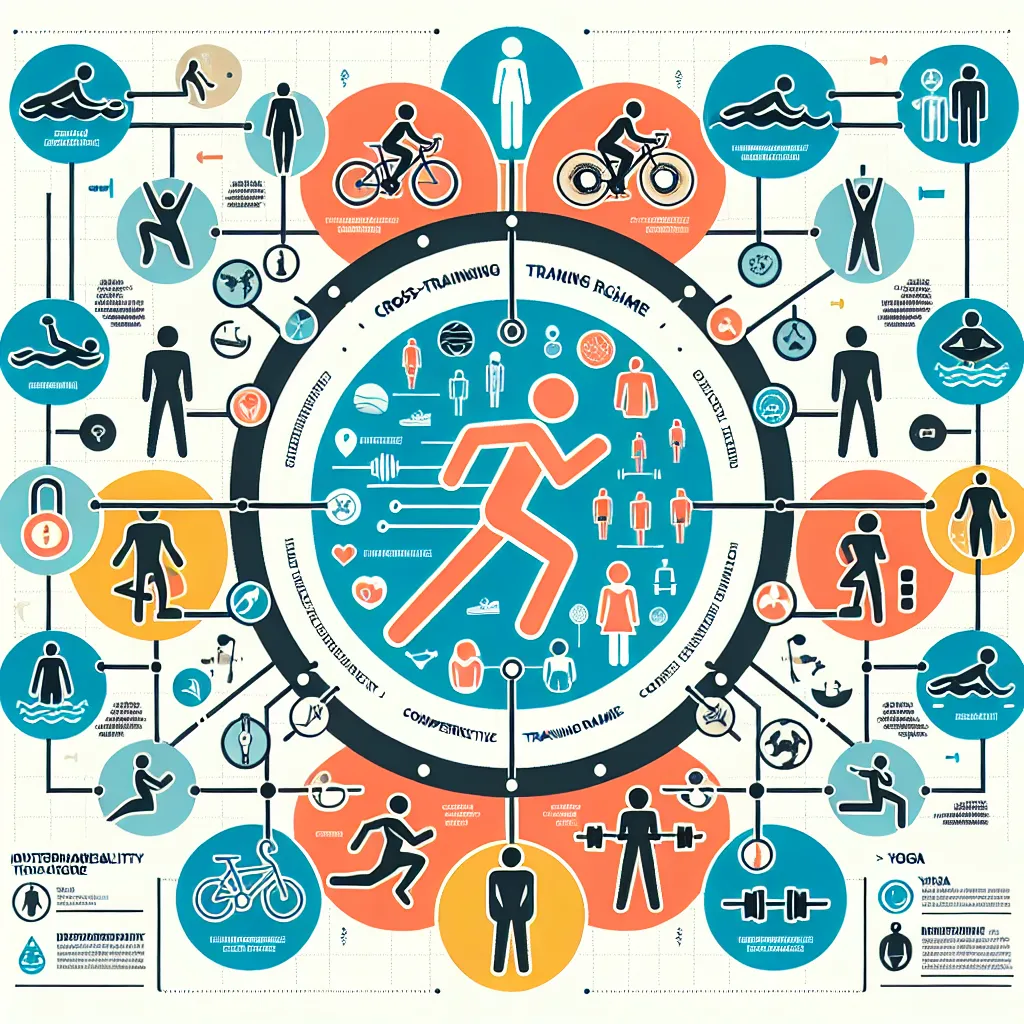‘Cross-training’ is a versatile term that has gained significant importance in both sports and professional contexts. Let’s break it down:
Definition: Cross-training refers to the practice of engaging in various types of exercise or activities to improve overall performance and fitness.
Part of speech: Noun (can also be used as a verb in its infinitive form ‘to cross-train’)
Pronunciation: /krɔːs treɪnɪŋ/
In the realm of sports and fitness, cross-training is particularly relevant. It involves incorporating different types of exercises or sports into one’s routine to enhance overall athletic performance, reduce the risk of injury, and prevent burnout.

Context and Usage of ‘Cross-training’
Examples in Context
-
The marathon runner incorporated swimming into her regimen as a form of cross-training to improve her overall endurance.
Analysis: This sentence demonstrates how cross-training can be used in a specific sport (marathon running) by adding a different activity (swimming) to enhance performance. -
Many professional athletes engage in cross-training during their off-season to maintain fitness and prevent injuries.
Analysis: Here, cross-training is presented as a strategy used by elite athletes, highlighting its importance in injury prevention and maintaining fitness levels. -
The company encouraged employees to participate in cross-training programs to develop a more versatile workforce.
Analysis: This example shows how the concept of cross-training extends beyond sports into the professional world, where it refers to learning different job roles or skills. -
As part of her IELTS preparation, Sarah practiced cross-training her language skills by alternating between reading, writing, listening, and speaking exercises.
Analysis: This sentence creatively applies the concept of cross-training to language learning, specifically IELTS preparation, illustrating how varied practice can improve overall performance. -
The fitness instructor recommended cross-training to her clients to prevent plateaus in their workout routines.
Analysis: Here, cross-training is presented as a solution to a common fitness problem, showcasing its practical application in everyday exercise regimens.
Common Contexts
Cross-training is frequently encountered in:
- Sports and fitness discussions
- Athletic training programs
- Corporate training and development
- Educational settings, including language learning
- Health and wellness articles
Frequency in IELTS
In IELTS exams, ‘cross-training’ may appear in:
- Reading passages about sports, fitness, or workplace efficiency (moderate frequency)
- Listening sections discussing training methods or fitness routines (low to moderate frequency)
- Writing Task 2 essays on topics related to health, sports, or professional development (low frequency)
- Speaking part 3 discussions about exercise, work-life balance, or skill development (moderate frequency)
Vocabulary Analysis
Word Structure
‘Cross-training’ is a compound noun formed by combining two words:
- ‘Cross’: indicating a movement or action across or between different areas
- ‘Training’: the action of teaching or developing a particular skill or behavior
This structure hints at the meaning: training that crosses over different disciplines or methods.
Synonyms and Antonyms
Synonyms:
- Multidisciplinary training /ˌmʌltɪdɪsəˈplɪnəri ˈtreɪnɪŋ/ (noun): Training involving several disciplines or areas of study.
- Varied conditioning /ˈveərid kənˈdɪʃənɪŋ/ (noun): Diverse forms of physical or mental preparation.
- Interdisciplinary practice /ˌɪntədɪsəˈplɪnəri ˈpræktɪs/ (noun): The practice of combining different fields of study or expertise.
Antonyms:
- Specialization /ˌspeʃəlaɪˈzeɪʃən/ (noun): The process of concentrating on and becoming expert in a particular subject or skill.
- Monotraining /ˈmɒnəʊˌtreɪnɪŋ/ (noun): Training that focuses on a single type of exercise or skill (note: this is a less common term).
Memorization Techniques
Mind Mapping
Create a mind map with ‘Cross-training’ at the center, branching out to different contexts (sports, workplace, education) and benefits (improved performance, versatility, injury prevention).
Storytelling Technique
Imagine a character named “Cross” who is a trainer. Cross helps athletes by introducing them to various sports and exercises, symbolizing the diverse nature of cross-training. This personification can help in remembering the concept and its benefits.
Practice Exercises
Application in Sentences
- Write a paragraph about how cross-training could benefit a student preparing for the IELTS exam.
- Compose a short dialogue between a fitness trainer and a client discussing the advantages of cross-training.
- Create a sample IELTS Writing Task 2 response on the topic: “Some people believe that specialization is key to success, while others argue that a more varied approach like cross-training is beneficial. Discuss both views and give your opinion.”
Repetition and Review
Set reminders to use ‘cross-training’ in conversations or writing exercises at regular intervals (e.g., 1 day, 1 week, 1 month) to reinforce long-term memory.
Conclusion
Mastering the term ‘cross-training’ not only enriches your IELTS vocabulary but also introduces you to a concept applicable in various life aspects. From enhancing athletic performance to boosting professional skills, understanding and using this term effectively can significantly improve your language proficiency and exam performance.
We encourage you to start incorporating ‘cross-training’ into your English usage immediately. Try creating sentences or short paragraphs using this term in different contexts. Share your experiences or any questions about using this vocabulary in the comments section below. Remember, consistent practice across different language skills is key to IELTS success – a perfect example of cross-training in language learning!